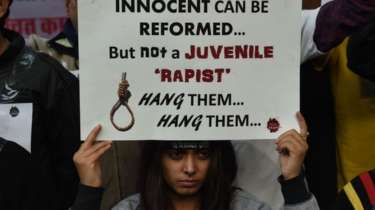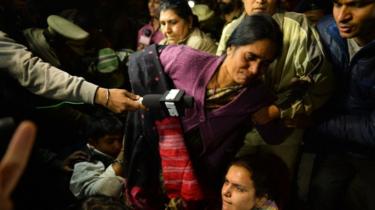India toughens law for juvenile crimes including rape


The Indian parliament has passed a bill which allows juveniles between 16 and 18 years of age to be tried as adults for serious crimes like rape or murder.
At present, those under 18 can be sentenced to a maximum of three years in a reform facility.
The move to change the law gathered momentum after the youngest convict in the notorious 2012 Delhi gang rape was recently released from detention.
The parents of the victim were among those campaigning to change the law.
On Tuesday, the Juvenile Justice Bill was passed by the Rajya Sabha – the upper house of the parliament.
The bill was approved by the Lok Sabha – the lower house – in May.
It will now have to be signed by the president to become law – which, correspondents say, is a mere formality.
The new law will not apply to the youngest 2012 rapist, but it will be used in future cases involving juvenile offenders above 16 years.
Authorities say the number of juvenile crimes have been increasing – last year, 38,565 cases were registered, including many cases of rapes, murders and acid attacks.
The supporters of the new law say tougher punishment will act as a deterrent.
However, critics say that India is a signatory to the UN Convention on the Rights of the Child which mandates that all children under the age of 18 be treated equally, and say the new law will violate the convention.
Jyoti Singh, a 23-year-old physiotherapy student, died after being brutally raped by five men and one minor on a moving bus in 2012.
The attack sparked a huge public outcry in India and forced the authorities to introduce tough new laws to deal with crimes against women.
Her mother Asha Devi said she was “satisfied” at the bill’s passing. “But I am sad that my daughter did not get justice,” she added. Asha Singh, the mother of the victim, was among those campaigning for a change to the law
Asha Singh, the mother of the victim, was among those campaigning for a change to the law
Four adult convicts in the case are appealing against death sentences. A fifth died in prison.
But the youngest of her attackers, who was 17 at the time of the crime, was sentenced to three years and released recently.
During his trial in a juvenile court, there were calls to try him as an adult and protests were held over the weekend against his release.
Since his release, the rapist has been housed with a charity because of fears over his safety.
On Monday, India’s Supreme Court dismissed an appeal to stop his release, saying it “shared” the concern of most citizens but its hands were “tied” by the law.
Source : BBC World News



































